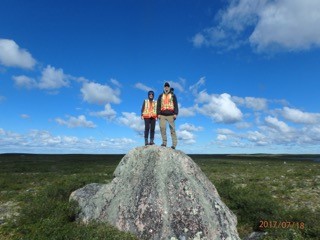Project: Molecular biology in mineral exploration
Bianca’s project involves the evaluation of the application of molecular biology to mineral exploration. The project aims at assessing and developing a more robust method of through-cover mineral exploration. This aids in initial discovery, as well as delineating targets more effectively to contribute to more successful mine development and resource extraction.
Microorganisms are everywhere and extremely abundant in soils, contributing to their statistical power in this study. Microbial communities are very sensitive to subtle changes in subsurface chemistry on short timescales, which is an added advantage when assessing changes in microbial abundances experimentally. Three main goals drive the project: i. qualifying and quantifying microbial profiles in till above zones of mineralisation relative to background soils and creating database of indicator species for different deposit types, ii. evaluating the relationships between geochemistry, physical chemistry, and microbial footprints to determine the driving factors in microbial community shifts, and iii. develop practical field and analytical procedures and protocols for the mineral exploration industry.
